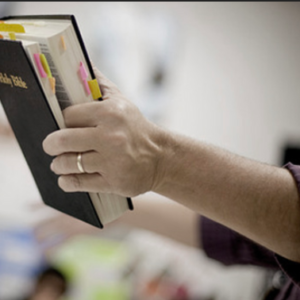Editor’s Note: For an alternative viewpoint, please see Point: Students Miss Out When Religious Debate is Banished from Classroom
An elementary school teacher walks around her classroom in Louisiana asking each of her young students what they want to pray for, they bow their heads and she recites a Christian prayer. But not all of her students are Christian. Do they opt out and risk being ostracized?
A coach in Michigan leads his players in prayer on a public high school football field after the games. But not all the kids agree with the coach’s faith, and some are not religious at all. Do they not participate, but then have to worry about the coach retaliating and not letting them play in the next game?
Even as we turn the corner into 2019 in America, debates about the proper role of religion in public schools are widespread. But they shouldn’t be. Too many communities have been torn apart by these contentious fights. There is an answer that should please most people while protecting the rights of young people: Schools should teach, but not preach, religion.
The reason for this becomes clear when you stop and think about the mandate of public education in a pluralistic society. Public schools should give all kids an equal sense of belonging and respect their rights. In the United States, where religious freedom is woven into our cultural and historical DNA, thousands of religions have flourished — and a growing number of Americans choose no faith at all. School boards, principals and teachers must embrace this reality, and this means they must not be in the business of deciding which religious beliefs matter for students, and which don’t. Decisions about when, where, how and if we pray are among the most intimate and personal ones we make. They are for families and individuals to decide.
This issue hits home to me in part because I am Jewish. My parents went to public school, I attended a public school, and I have sent all three of my children to public schools. I shouldn’t have to worry that my kids won’t feel comfortable in their own classrooms because of their religious views. A “my-way-or-the-highway” classroom that assumes one religious path is right, true and good is damaging for kids who are not part of the majority religion.
Preaching in public schools also undermines the unifying role public schools play in our communities. More than 90 percent of our nation’s children attend public schools. Those institutions are open to all students regardless of religion, race or ability; they should be safe spaces that enable all students to learn and grow. Public schools bring us together across our differences, rather than divide us because of them.
The Constitution guarantees each of us religious freedom: the right to believe what you want, or not believe at all. Preaching in public schools undermines that precious right. The first 16 words of the First Amendment are clear: “Congress shall make no law respecting an establishment of religion, or prohibiting the free exercise thereof.” Allowing teachers and administrators to pressure or force kids to pray flies in the face of 227 years of American democracy and the fundamental principle of church-state separation.
Some may think that opposing official prayer in public school means that our schools must be “religion-free zones.” But telling teachers and school officials that they can’t preach to their students does not in any way bar our educators from teaching about religion. Preaching and teaching are very different things.
Religion’s effect on humanity and American life in particular is undeniable — and profound. In fact, you simply can’t understand subjects such as history, art, music, literature and even science without grasping how religion has shaped our thinking. So, of course, a public school teacher should have the right to discuss religion with students — as long as it’s part of a legitimate program of instruction.
American society is grounded in religious freedom. We should celebrate, treasure and honor this right and the diversity it fosters. A critical way to do that in the public school arena is to keep our schools focused on education and ensure that decisions about the faith of our children rest where they belong: safely in the hands of America’s families.

